In today’s health-conscious world, we often hear about calories in versus calories out when discussing weight management. This concept, known as energy balance, is fundamental to understanding how our bodies gain, maintain, or lose weight. But what exactly is a positive energy balance, and how does it impact our overall well-being? While Western medicine focuses primarily on the mathematical equation of caloric intake and expenditure, Eastern healing traditions offer a more nuanced perspective that considers the flow of vital energy throughout the body.
A positive energy balance occurs when we consume more energy (calories) than we expend through daily activities and bodily functions, a concept further explored in Energy Balance In Thermodynamics. In Western terms, this surplus energy gets stored as fat, leading to weight gain over time. However, Eastern medicine traditions view this imbalance not merely as a numerical excess but as a disruption in the body’s natural energy flow—a concept that has profound implications for both weight management and holistic health.
Understanding this dual perspective—where modern nutritional science meets ancient wisdom—can revolutionize our approach to weight management and overall wellness. By examining positive energy balance through both lenses, we gain a more comprehensive understanding of how our bodies function and how we can achieve optimal health through balanced energy.
Eastern Medicine’s View on Energy Flow: Qi and Prana
In Traditional Chinese Medicine (TCM), the concept of Qi (pronounced “chee”) stands as the cornerstone of health and vitality. Qi is often described as the vital life force or energy that flows through the body along specific pathways called meridians. Similar to Qi, Ayurvedic medicine recognizes Prana as the essential life energy that sustains all physiological and psychological functions.
Unlike the Western view that primarily focuses on physical components, Eastern medicine traditions emphasize that this energy flow directly influences every aspect of health—including weight management. When Qi or Prana flows freely and harmoniously throughout the body, all bodily systems function optimally. However, when this energy becomes stagnant, excessive, or deficient, health problems arise—including weight gain.
According to TCM practitioners, specific disruptions in energy flow directly contribute to weight management issues:
“When Qi becomes stagnant in the digestive system, it affects the body’s ability to transform food into energy efficiently,” explains Dr. Chen, a renowned TCM practitioner. “This stagnation can lead to a positive energy balance as the body fails to properly metabolize nutrients and eliminate waste.”
In Ayurvedic medicine, imbalances in the doshas (biological energies) can similarly affect metabolism and weight. Particularly, Kapha dosha imbalances are associated with slower metabolism, water retention, and weight gain—a classic manifestation of positive energy balance from an Ayurvedic perspective.
Understanding these energy systems offers a deeper perspective on why simply counting calories often fails to produce sustainable weight management results. When our vital energy is imbalanced, even perfect caloric calculations may not yield expected outcomes.
Energy Metabolism Through the Lens of Yin and Yang
The ancient Chinese concept of Yin and Yang—complementary opposing forces that must remain in balance—provides a sophisticated framework for understanding energy metabolism beyond mere calorie counting.
In TCM, the body’s metabolic functions represent a delicate dance between Yin (cooling, nourishing, substance) and Yang (warming, activating, function) energies. Yang energy drives metabolic processes and energy expenditure, while Yin provides the substances necessary for building and repairing tissues.
When it comes to positive energy balance and weight gain, TCM identifies several key patterns of Yin-Yang imbalance:
Yang Deficiency: Insufficient metabolic fire leads to poor energy conversion, causing nutrients to be stored rather than burned. This manifests as fatigue, cold extremities, and gradual weight gain—especially around the abdomen.
Spleen Qi Deficiency: The Spleen system (which includes digestive functions in TCM) fails to properly transform food into energy, resulting in dampness accumulation and weight gain. Symptoms include bloating, loose stools, and feelings of heaviness.
Liver Qi Stagnation: Emotional stress causes energy to become stuck, disrupting the smooth flow of Qi throughout the body and interfering with proper metabolism. This often leads to irregular eating patterns, emotional eating, and weight fluctuations.
This perspective helps explain why two people following identical diets might experience dramatically different results. According to Eastern medicine, your constitutional type and current energy balance significantly influence how your body processes and utilizes energy from food.
A 2019 study published in the Journal of Traditional Chinese Medicine found that participants who received treatments targeting their specific pattern of energy imbalance achieved more sustainable weight loss than those following standard calorie-restricted diets alone. This research suggests that addressing the underlying energy dynamics may be crucial for long-term weight management success.
Restoring Positive Energy Balance: Eastern Approaches
Eastern medicine offers numerous techniques to restore proper energy flow and balance, addressing the root causes of positive energy balance rather than just its symptoms. These approaches aim to optimize the body’s natural ability to convert food into energy efficiently while eliminating excess and waste.
Acupuncture for Energy Regulation
Acupuncture, a cornerstone of TCM, involves the strategic placement of thin needles at specific points along the body’s meridians to regulate Qi flow. Research increasingly supports its effectiveness for weight management, as shown in systematic reviews and meta-analyses. A 2018 meta-analysis published in the International Journal of Obesity found that acupuncture treatments significantly enhanced weight loss when combined with lifestyle modifications.
“Acupuncture helps balance the body’s energy system by addressing specific points that influence metabolism, appetite, and digestion,” explains acupuncturist Sarah Wong. “By targeting points associated with the Spleen, Stomach, and Kidney meridians, we can optimize the body’s energy utilization.”
Ear acupuncture, or auriculotherapy, has shown particular promise for weight management. Small seeds or beads placed at specific points on the ear stimulate acupressure points linked to appetite control and metabolism, helping to regulate positive energy balance naturally.
Herbal Remedies for Metabolic Balance
Eastern herbal traditions offer numerous botanicals that help restore proper energy metabolism:
- Green tea: Contains catechins that boost metabolism and help the body utilize stored fat for energy
- Ginseng: Improves energy utilization and combats fatigue, helping to maintain active lifestyle
- Hawthorn berry: Aids digestion and helps clear stagnant energy in the digestive system
- Cinnamon: Enhances insulin sensitivity for better glucose metabolism
- Ginger: Stimulates digestion and circulation, supporting efficient energy conversion
These herbs work not by artificially suppressing appetite but by optimizing the body’s natural energy processes—addressing the root cause of positive energy balance rather than just the symptoms.
Dietary Wisdom from Eastern Traditions
Eastern nutritional approaches focus less on calorie counting and more on the energetic qualities of foods:
- Warming foods (like ginger, cinnamon, and moderate amounts of lean meats) stoke the digestive fire and support efficient metabolism
- Cooling foods (like cucumber, watermelon, and many leafy greens) help clear excess heat and reduce inflammation
- Bitter foods (like dandelion greens and certain herbs) support detoxification and improve liver function
- Pungent foods (like turnips, radishes, and moderate spices) help break up stagnation and improve circulation
In TCM, dietary therapy always considers the individual’s constitutional type and current pattern of imbalance. “There is no one-size-fits-all approach,” notes nutritionist Dr. Lin. “A diet that helps one person achieve balance might create imbalance in another.”
Integrating Eastern Wisdom with Western Nutritional Science
The true power of addressing positive energy balance comes from integrating the best of both Eastern and Western approaches. Modern nutritional science provides valuable insights into macronutrients, micronutrients, and caloric requirements, while Eastern traditions offer wisdom about energy quality, constitutional differences, and the importance of harmony and balance.
Recent research increasingly supports this integrated approach. A 2020 study from the Singapore Chinese Health Study found that a diet rich in vegetables, fruits, and soy foods—staples in many Eastern diets—reduced diabetes risk by 25% compared to typical Western diets high in processed foods and red meat.
The integration of these approaches is creating exciting new possibilities for personalized nutrition and weight management:
- Constitution-based dietary recommendations that consider both nutritional needs and energy patterns
- Chronobiology-informed meal timing that aligns with the body’s natural energy rhythms
- Functional food combinations that enhance digestion and nutrient absorption
- Mindful eating practices that improve the body’s ability to register satisfaction and process food efficiently
This integrated approach acknowledges that positive energy balance isn’t just about quantity but also about quality—both of food and of the body’s energy processing systems.
Beyond Physical: The Mind-Body Connection in Energy Balance
Eastern medicine traditions have long recognized what Western science is increasingly confirming: emotional and mental states profoundly influence physical processes, including metabolism and weight management.
In TCM, emotions are understood to directly affect the flow of Qi throughout the body:
- Anger disrupts Liver Qi, interfering with smooth energy flow
- Worry knots Spleen Qi, hampering digestion and metabolism
- Fear depletes Kidney Qi, reducing vitality and resilience
- Grief constrains Lung Qi, affecting the body’s rhythms and cycles
These emotional influences can contribute to positive energy balance and weight gain through multiple mechanisms:
“Emotional stress triggers cortisol release, which influences hunger hormones and fat storage patterns,” explains Dr. Zhang, who integrates Eastern and Western medicine in her practice. “But beyond these biochemical effects, emotions directly impact the flow of energy through the body’s meridian system, creating patterns of stagnation or depletion that affect metabolism at its core.”
Eastern practices like qigong, tai chi, and meditation help restore balance to this mind-body system, harmonizing emotions and energy flow. Research from the University of California found that participants in an 8-week mindfulness program showed significant improvements in cortisol patterns, emotional eating behaviors, and weight management compared to control groups.
Recent Research: Traditional Wisdom Meets Modern Science
The scientific community is increasingly recognizing the value of Eastern approaches to energy balance and metabolism. A groundbreaking 2021 study published in the Journal of Integrative Medicine examined the effects of traditional Chinese herbal formulations on myocardial energy metabolism. The research demonstrated that specific herb combinations significantly improved cardiac efficiency by optimizing cellular energy production—findings that have profound implications for understanding how these herbs might influence whole-body energy metabolism.
Similarly, research into acupuncture’s effects on metabolism has revealed that specific point stimulation influences hypothalamic signaling pathways that regulate appetite, satiety, and energy expenditure. These findings help explain the mechanisms behind acupuncture’s observed benefits for weight management.
As our understanding of both traditional practices and modern physiology deepens, we’re discovering that many ancient wisdom traditions intuitively grasped complex physiological principles that we’re only now able to measure and verify with advanced technology.
The concept of positive energy balance—viewed through this integrative lens—becomes not just a mathematical equation of calories in versus calories out, but a sophisticated understanding of how energy flows, transforms, and sustains us on multiple levels.
By honoring both the wisdom of ancient healing traditions and the insights of modern science, we can develop more effective, personalized approaches to weight management and overall well-being. Learn more about this integration at Understanding Yin and Yang in Traditional Chinese Medicine. This integrated perspective recognizes that true health comes not from forcing the body into submission but from restoring its natural harmony and balance—allowing our innate wisdom to guide us toward optimal energy utilization and vibrant health.


